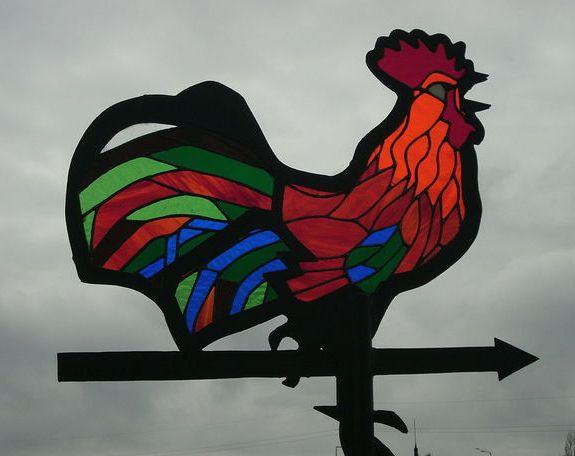The Farmyard Cock and the Weathercock Andersen's fairy tale

Once there were two cocks, one on a dunghill and one on the roof, both of them conceited; but which of the two did the most? Tell us what you think - we'll keep our own opinion, anyway.
The chicken yard was separated by a board fence from another yard, where there lay a manure heap, and on this grew a great cucumber, which was fully aware of being a forcing - bed plant.
"That's a privilege of birth," said the Cucumber to herself. "Not everyone can be born a cucumber; there must be other living things, too. The fowls, the ducks, and the cattle in the next yard are creatures, too, I suppose. I now look up to the Farmyard Cock on the fence. He certainly is much more important than the Weathercock way up there, who can't even creak, much less crow, who has no hens or chickens, who thinks only about himself and perspires rust. No, the Farmyard Cock - he's a real cock! His walk is like a dance, to hear him crow is like music, and whenever he comes around people can hear what a trumpeter he is! If he would only come over here! Even if he should eat me up, stalk and all, it would be a happy death!" said the Cucumber.
That night the weather turned very bad. The hens and chickens and even the Cock himself sought shelter. The wind blew down the fence between the two yards with a terrific crash; tiles fell from the roof, but the Weathercock sat firm. He didn't even turn around, because he couldn't. Although he was young and just cast he was very steady and sedate. He had been "born old," and wasn't a bit like the sparrows and swallows that fly through the vault of heaven. He despised them; "Ordinary piping birds of no importance!" he called them. He admitted that the pigeons were big and glossy, and gleamed like mother-of-pearl, and almost looked like some kind of weathercock, but then they were fat and stupid, and all they could think of was stuff themselves with food.
"Besides, they're such terrible bores to associate with," said the Weathercock.
The migratory birds had also visited the Weathercock and told him tales of foreign lands - of caravans in the sky and fierce robber stories of encounters with birds of prey - and that was new and interesting the first time, but the Weathercock knew that afterward they kept repeating themselves, and that became monotonous.
"They're boring, and everything is dull. Nobody's fit to associate with; all of them are tiresome and dull. The world is no good!" he said. "The whole thing is a bore!"
The Weathercock was what you might call blasé, and that would certainly have made him interesting to the Cucumber if she had known about it; but she had eyes only for the Farmyard Cock, who had now come into her own yard.
The wind had blown down the fence, but the lightning and the thunder were over.
"How's that for crowing? the Farmyard Cock said to his hens and chicks. "It was a little rough perhaps - not elegant enough."
And the hens and chickens picked at the manure heap, while the Cock strutted to and fro on it like a knight.
"Garden plant!" he said to the Cucumber; and with that word she understood his great importance and forgot that he was pecking at her and eating her up - a happy death!
Then the hens came and the chickens came, for when one of them runs somewhere the rest run, too; they clucked and chirped and gazed at the Cock and were proud that he belonged to them.
"Cock-a-doodle-doo!" he crowed. "The chickens will immediately grow up to be fine large fowls if I make a noise like that in the chicken yard of the world!"
And the hens and chickens answered him with their clucking and their chirping. And then the Cock told them a great piece of news. "A cock can lay an egg, and do you know what that egg has inside it? In that egg there's a basilisk. But no one can stand the sight of a basilisk. People know that, and now you know it, too - you know what's in me, and what a wonderful fellow I am!"
With that the Farmyard Cock flapped his wings, swelled up his comb, and crowed again. All the hens shivered, and the little chickens shivered, but they were tremendously proud that one of their kind should be such a cock of the world. They clucked and they chirped until the Weathercock could hear it; he heard it, but he never moved.
"It's all stupid nonsense!" said a voice within the Weathercock. "The Farmyard Cock never lays eggs, and I'm too lazy to do it. If I wanted to I could lay a wind egg; but the world isn't worth a wind egg. It's all stupid nonsense. And now I don't even want to sit here any longer."
With that the Weathercock broke off; but he didn't fall on the Farmyard Cock and kill him, "although he intended to!" said the hens. And what's the moral of this? "It is better to crow than to be 'stuck-up' and break off!"